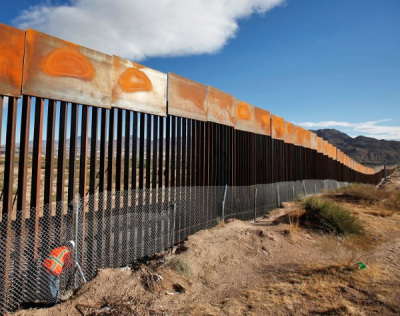Are walls 'an immorality?' Not according to the Bible

We Americans now disagree over the construction of a border wall to be placed between the United States and Mexico. In the first week of her Speakership, Nancy Pelosi declared that such a wall would be “an immorality.” She does not appear to be alone in that assessment. Representative Alexandria Ocasio-Cortez (D-N.Y.) compared such a wall to the Berlin Wall while calling it a “moral abomination.”
Like any human instrument, a wall can serve good or evil purposes. For example, the Berlin Wall was an evil device constructed by a malevolent political system, Representative Ocasio-Cortez got that right at least. But her implication that America’s border barrier is analogous to the communist wall that preserved East German tyranny is dishonest.
That said, walls clearly can be a force for good. The Bible quite clearly demonstrates that truth in its account of the life of one of the Jewish people’s greatest prophets and heroes – Nehemiah. Nehemiah’s great physical task was to rebuild the wall and gates that had once protected Jerusalem from invaders, marauders, and criminals. All this was part of Nehemiah’s (and God’s) larger project – one of spiritual renewal and recommitment to their covenant relationship with God. The book of Nehemiah describes the prophet’s bravery, leadership, and holiness.
To tell the story meaningfully, we first need a brief history recap. Recall that the Babylonian king, Nebuchadnezzar, completed his conquest of the kingdom of Judah, and its capital, Jerusalem in 586 B.C. (The Kingdom of Israel had fallen to the Assyrians in 722.) Around 586, Jerusalem and the Temple built by Solomon approximately 400 years earlier was destroyed, and a final mass deportation of Jews to Babylon took place.
About fifty years later, Persia’s Cyrus the Great conquered Babylon and soon issued a decree allowing the Babylonian Jews to return home. The return was a drawn-out process lasting almost a century. In fact, many Jews remained in Babylon forming a large community that would remain there until the advent of the anti-Semitic Baath party following the Second World War. Now, there is essentially no Jewish presence in Baghdad – and very little in Iraq.
Nehemiah begins around 445 B.C.with a report the prophet hears that the Jewish “remnant” community, the early returners to Judah, was in great trouble. Furthermore, he was told that the “wall of Jerusalem is broken down, and its gates are destroyed by fire” (Neh. 1:3, ESV). This news thrust Nehemiah into a period of profound despair marked by prolonged prayer and fasting. Such despondency would not have been historically significant except that as Nehemiah reveals: “Now I was cupbearer to the king.”
This dramatic unveiling is crucial to the course of events because the king, Artaxerxes I, observed his servant’s depression and asked about its cause. Nehemiah told him the woeful tale and asked to be allowed to return to Jerusalem for a time to rebuild the gates and the wall surrounding the Holy City. The king granted his request and gave him the needed resources because, as Nehemiah notes, “the good hand of God was upon me.”
Nehemiah returned and quickly met stiff resistance from the enemies of the Jews. Led by two men named Sanballat and Tobiah, they were furious that Nehemiah was leading his people in rebuilding Jerusalem’s wall. The struggle is vividly retold in chapter four where the wall is deemed to be essential for the survival of a revived Jewish community.
Above all, Nehemiah tells of the prophet’s faith that God would protect them while they carried out this great work. Nehemiah and his workers were so imperiled that they had to hold their swords and spears while completing this construction project. The project almost failed, but they finished their task in less than two months.
Obviously, the present-day United States is not Old Testament Israel. It is equally clear, however, that despite the span of centuries, building an impregnable barrier was necessary for the prophet’s plan of Jewish revival in Jerusalem – a highly moral act that has benefited all mankind for millennia.
President Trump’s border wall shares many of the society-protecting features that Nehemiah’s possessed. Yet, there is a deeply humanitarian aspect to Trump’s proposed barrier. By reducing the length of open border and the possibility for large zones of rampant illegality, the proposed wall would protect the most vulnerable of those coming north. Our wide-open border has become a magnet for drug, sex, and labor trafficking. The cartels are run by sociopaths. Their “coyotes” are not concerned with the safety and sexual protection of the women and girls they exploit. An open border is an inhumane border.



























